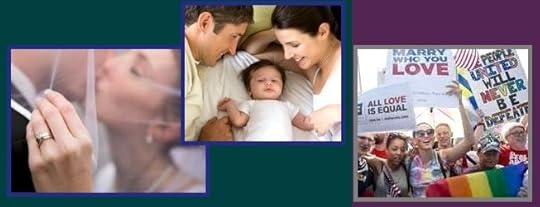Defining the Obvious
Defining the Obvious | Deacon Tracy W. Jamison, Ph.D.
| HPR
The U.S. Supreme Court’s landmark decision to strike down Section 3 of the federal Defense of Marriage Act as unconstitutional is an example of how basic definitions logically determine what is regarded as morally just and what is regarded as morally unjust.
It is not always easy to define the
obvious. To define something requires us to specify its essence by
indicating its form and matter. A definition must specify a form by
indicating a specific difference within a genus. Thus, the endeavor is
often considered to be scientific or philosophical. It generally
requires some familiarity with basic logic. Definitions delineate the
extensions of terms which signify the specific natures of things. A
given description is a true definition if, and only if, it
distinguishes, all and only, the members of a kind. If a particular
proposition fails to distinguish, all and only, the things of a kind,
then it may be an adequate description, but it is not a definition.
Activities and relations can be defined as readily as substances can. To
take an example from Plato’s Sophist, the activity of angling
can be defined as the activity of attempting to catch fish by means of a
line and a hook. Thus, the proximate genus of angling is the activity
of attempting to catch fish. There are other ways, besides angling, to
catch fish. The specific difference of angling is the use of a line and a
hook. If we are not using a line and a hook, then we are not angling.
And every instance of using a line and a hook, in the attempt to catch
fish, is some form of angling.
A definition of an activity also
indicates the intrinsic purpose of the activity in accord with its
essential ends. The intrinsic purpose of the activity of angling, for
example, is to catch fish. A good angler is someone who has ability and
success in catching fish specifically with a line and a hook. Thus, the
specific perfective good of angling is the capture of fish with a line and a hook. The delectable
good of angling, by contrast, is the specific pleasure that attends the
activity. This pleasure is greatly enhanced whenever the activity
attains all of its essential ends. The delectable good of
angling, however, is not what makes someone an angler. A person can be a
good angler and experience no pleasure at all in the activity. And a
person can experience part of the specific pleasure of angling without
actually catching any fish. The perfective good, not the delectable
good, is what makes an activity to be the kind of activity it is. Thus,
a person is an angler only insofar as that person is engaging in an
activity that is intrinsically ordered to catching fish with a line and a
hook. This specific kind of activity is what makes a person an angler,
even if the person unfortunately fails to catch any fish.
Societies often find it necessary and
prudent to regulate certain kinds of activities. Any law that regulates a
given activity presupposes a definition of that activity. In our
society, for example, there are certain laws that pertain to the
activity of angling. It normally requires a license. The license to
angle does not permit the activity of catching fish with nets, dynamite,
etc. Angling must be done in such a way to hook fish in the mouth,
rather than snagging them, etc. Angling is permitted only at designated
times and places, and so on. Like any other kind of human activity,
angling has an essence that exists prior to its definition, and prior to
any laws that regulate the activity. The possession of a license to
angle is not what makes a person an angler. A person is an angler only
insofar as that person actually engages in the activity of angling in
accord with its essential ends. And a person is a good angler only
insofar as that person is actually able to catch fish by means of a line
and a hook.
Now suppose that in our society there
were significant social benefits formally attached to angling that were
not also attached to, say, kite-flying, and similar recreational
activities.
Carl E. Olson's Blog
- Carl E. Olson's profile
- 20 followers




